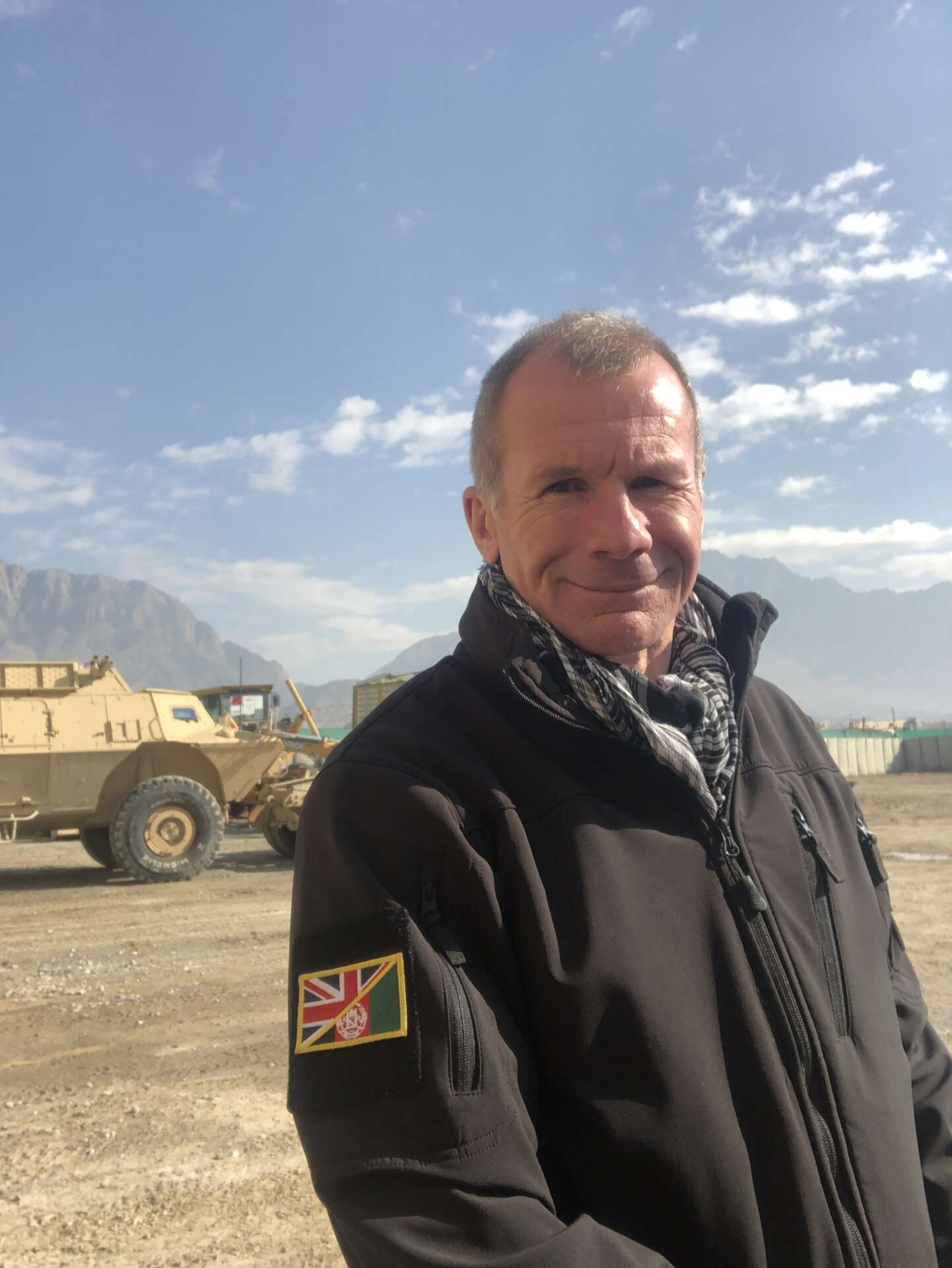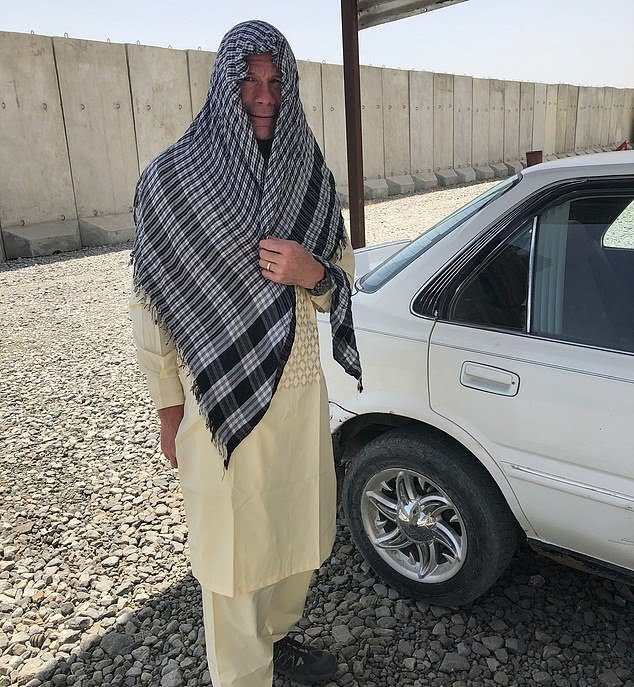
Our Project Manager, Lloyd Comer, was one of the last British civilians to escape Afghanistan when the Taliban took over two years ago this month. He reflects on his harrowing escape and explains why he’s still helping his former Afghan colleagues, writes Fran McElhone
Lloyd has only recently been able to talk about his experience of being evacuated from Afghanistan when the Taliban took over.
Splash MD Simon Poole, who is also a longstanding friend of Lloyd’s, invited him to be the motivational speaker at our project with Imperial Business School in Portugal this May, and he ended up sharing details he’d never even told his wife, due to emotions still running high.
“I’d be lying if I said it was an easy decision to talk about it publicly,” said Lloyd, a former Royal Engineers Officer. “But all I want to do is raise awareness about the plight of my Afghan friends in case it kickstarts something to help them. It was tough – I but I’m glad I did it.”
Lloyd, 62, was one of the last British civilians to be evacuated from Afghanistan, having lived there for the best part of eight years. Most recently, he’d spent three years heading up an ambitious project with a US transport maintenance company contracted by the Afghan National Army and Afghan National Police which involved training their personnel. Prior to that, Lloyd worked as a National Logistics Manager for an intelligence training contract and a Project Manager for an Australian Embassy reconstruction project in Kabul.
When news broke that the Taliban were taking over, the UK Foreign Office told all British nationals to leave, via social media. But, given how volatile – and deadly – the situation had suddenly become, FO officials instructed Lloyd to stay put and await further advice.
“The Foreign Office told me to stay where I was in Kabul,” said Lloyd. “But I knew if I’d stayed put, like they wanted me to, I probably wouldn’t have got out alive. I got home on the Wednesday, they contacted me asking if I was OK four days later on the Sunday. That says it all really.
“The airport was pandemonium. It was only through my network of ex-Army friends that I was able to find out where the evacuation handling cell was, at the Baron Hotel, near the airport. Once there, I had a higher chance of getting out.”
Lloyd disguised himself as an Afghan civilian, donning a shalwar kameez with a headscarf, and was driven by his friend in an inconspicuous Toyota saloon instead of the usual essential armoured vehicle, evading notice at three Taliban checkpoints.
“The whole thing was absolute chaos,” Lloyd recalls. “I spent 35 years in the Army and have seen how well we handle conflicts; lower ranks are incredible at getting the job done, and the guys on the ground were exemplary. It was at government level where the problems lay.”
Once at the hotel, soldiers from 2 Para got Lloyd and other expats to the airport gate where he was flown on a C-17 transport plane to the UAE, flying home to the UK via Spain.
When Lloyd, a father of three and grandfather of nine, arrived back in the UK, he was contacted by BBC Radio Four’s Today Programme and agreed to an interview. Then, somehow – he still doesn’t know the rest of the media posse got his number – he was bombarded with requests for interview, both by phone and by reporters who’d found out his home address in Nottingham, and ended up being featured by the Daily Mail; turning down requests from BBC Breakfast, Good Morning Britain, and the Sun.
“The Sun wanted to put me on the front page,” Lloyd laughs. “I’d rather be evacuated from Afghanistan again, than that!
“I wasn’t scared,” he added. “I’d served in multiple conflicts in the Army – Northern Ireland, Bosnia, Iraq, also deployments to Somalia, South Sudan and Yemen – and lived in Afghanistan for almost a decade after that so had plenty of tight situations before. My concerns were about what was going to happen to my friends and colleagues who were left behind. One of them sobbed on me like a distressed child, it was horrendous. That’s why I haven’t been able to talk about it.”
Lloyd left vowing to do what he could for two of his best friends, both former colleagues with wives and children, and has been working tirelessly ever since to try and get them resettled in the UK, sponsoring one of them through university in Kabul and sending him an allowance each month to help him put food on the table.
“Most of the civilian Westerners working in Afghanistan were ex-military, the Taliban know that, so we, and any Afghans working with us, were all at risk. One of my friends doesn’t have a permanent residence because he’s too scared about what the Taliban will do to him. Every couple of months he takes his wife and two kids somewhere else.”
According to the Refugee Council only 54 Afghans have been resettled out of the promised 5,000, not including those who arrived under the initial evacuation scheme.
“It’s pitiful,” continued Lloyd. “Whatever our government say about it being a success is BS. It was absolute chaos.
“We’re two years on and the appetite for helping the Afghans we abandoned and legitimate refugees, just isn’t there.
“I find it really really sad. I left when kids were still going to school, the universities were teeming with students, and there were facilities for women. Kabul was a vibrant place with opportunities.
“Everyone was sh*t scared of the Taliban, no-one wanted them back. They made all these false promises and they’ve gone back to the dark ages.
“When I was contracted there in 2018 we were three years away from making sure the police and army were sustainable organisations, we were making really good progress and then all of a sudden, we had the carpet pulled from under us.
“We had no time to prepare the Afghans for what was coming. As a result we’ve done them a massive disservice. We abandoned them because we weren’t going to stay without the Americans.”



